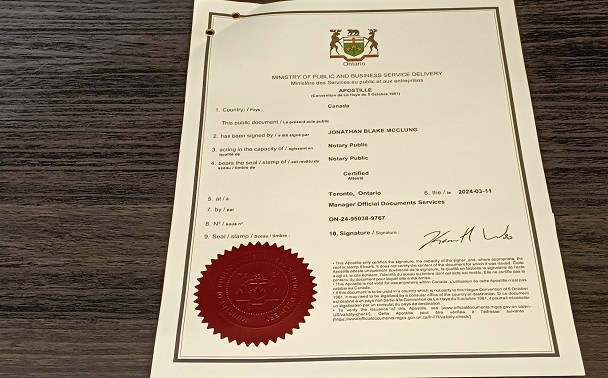Comprehending the Apostille Process: A Comprehensive Overview to International Document Verification
Navigating the elaborate landscape of worldwide file authentication can be intimidating without a clear understanding of the apostille procedure. What specifically specifies an apostille, and why is it so critical for records predestined for Hague Convention nations?
What Is an Apostille?
An apostille is a main certification that validates the credibility of a file for use in an additional nation. This qualification, released by an assigned authority in the country where the file originated, guarantees that the paper is acknowledged as valid and legitimate in the global field. The process of obtaining an apostille entails a number of steps, including the confirmation of the paper's trademarks, seals, and stamps by suitable governmental bodies.
The apostille acts as a worldwide acknowledged type of authentication, made feasible by the Hague Convention of 1961. This treaty, formally known as the Hague Convention Eliminating the Demand of Legalisation for Foreign Public Files, systematizes the procedure of paper certification amongst member countries. The apostille itself is a standard certification which contains particular details, such as the providing authority, the native land, and the date of issuance.
It is important to keep in mind that not all files are qualified for an apostille. Normally, public files like birth certifications, marriage licenses, court orders, and academic diplomas get this qualification. Exclusive files, such as contracts and arrangements, may call for notarization and extra steps to qualify.
Relevance of Apostille
Comprehending what an apostille is establishes the stage for appreciating its relevance in international ventures. houston tx apostille. An apostille, essentially a type of qualification provided by a marked authority, verifies the credibility of a document for use in international nations that are signatories to the Hague Apostille Convention. This standard process gets rid of the requirement for more legalization by embassies or consular offices, thus simplifying international transactions
The value of an apostille can not be overemphasized. It guarantees the credibility and approval of essential files-- such as birth certifications, marital relationship licenses, and educational diplomas-- throughout boundaries. For organizations, it facilitates the smooth conduct of international trade, mergings, and acquisitions by giving a relied on method of document verification. This decreases administrative obstacles, saving both time and resources.
Moreover, an apostille boosts lawful safety and security and conformity. Federal governments and organizations can confidently count on the credibility of records birthing an apostille, minimizing the threat of scams and misrepresentation. Thus, the apostille offers as an important device in advertising international participation and trust fund. Its duty in promoting effective and safe and secure worldwide transactions highlights its crucial worth in today's interconnected world.
Papers That Need Apostille
When participating in international deals or lawful matters, certain files often require the verification provided by an apostille. This ensures their acknowledgment and acceptance in countries that are signatures to the Hague Apostille Convention. Typically, individual records such as copyright, marital relationship certifications, and fatality certificates require an apostille, particularly when they are made use of for processes like immigration, marital relationship abroad, or international probate matters.
Educational files are one more group frequently requiring apostilles. Diplomas, transcripts, and academic records usually need this authentication for purposes such as going after more education and learning, employment, or professional licensing in a foreign country (houston tx apostille). This step ensures that the files are identified as legitimate and valid
Lawful documents, including powers of attorney, affidavits, and court orders, likewise typically require apostilles. Service records such as certifications of unification, laws, and business agreements might need browse around this site an apostille to promote international trade, establish foreign branches, or engage in cross-border lawful process.
Actions to Acquire an Apostille

Acquiring an apostille involves a multi-step procedure that ensures the authenticity and approval of your files in international countries. The initial step is identifying which documents need an apostille. houston tx apostille. Typical files include copyright, marital relationship licenses, scholastic transcripts, and corporate documents
As soon as determined, the document has to be accredited by the ideal providing authority. After accreditation, the document needs to be submitted to the marked Competent Authority in the file's nation of origin.
The submission process usually needs a completed application, the initial paper, and a charge. Some territories may use the option of expedited handling for an added cost. Upon effective verification, the Competent Authority will fasten the apostille certificate to the paper, thereby verifying its visit their website authenticity.
Typical Obstacles and Solutions
Browsing the apostille procedure can present several common difficulties that, if not appropriately resolved, might postpone or complicate file verification. Each nation has certain needs for the kinds of documents that can be apostilled, and any discrepancy from these can result in being rejected.
One more usual obstacle is understanding the diverse handling times. Handling times can vary dramatically between countries and even between different areas within the very same nation. It is necessary to make up these variants when preparing the apostille process to avoid unexpected delays.
Furthermore, language barriers can pose significant barriers. Records in an international language frequently try this website call for licensed translations, and any type of inaccuracies in translation can lead to more difficulties. Engaging a professional translation service can minimize this threat.

Verdict
Grasping the apostille process significantly boosts the performance of worldwide document verification. By understanding the need of determining and certifying called for papers, and browsing the entry to the Competent Authority, the procedure comes to be more convenient. Understanding of common challenges, such as insufficient submissions and language obstacles, additionally aids in protecting against prospective hold-ups. Making sure documents are effectively apostilled facilitates their acceptance in Hague Convention signatory nations, consequently sustaining smooth international lawful and administrative treatments.